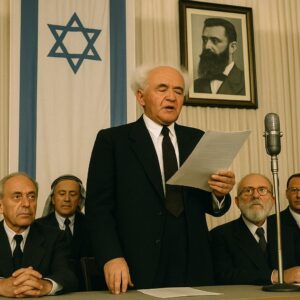On May 14, 1948, David Ben-Gurion stood in Tel Aviv and declared the establishment of the State of Israel. For many Jewish people around the world—especially Holocaust survivors—it was a moment of hope, a long-awaited return to a homeland. Yet for others, particularly the Palestinians who lived there, it marked the beginning of displacement, dispossession, and decades of conflict.
The birth of Israel was not a clean line drawn on a map—it was a rupture. Arab nations rejected the UN partition plan, and war erupted within hours of the declaration. By the time the fighting ended, over 700,000 Palestinians had become refugees. To Israelis, it was a war of independence. To Palestinians, it was the Nakba—the catastrophe.
The conflict that began in 1948 has echoed through generations. Borders shifted, treaties were signed and broken, uprisings flared, peace processes faltered. The land itself—sacred to Jews, Christians, and Muslims alike—remains contested ground. It is a place where history is not just remembered but relived, where every stone and settlement carries centuries of meaning and pain.
And yet, amid the tragedy, there is humanity. There are Israelis and Palestinians who work side by side for peace, who dream of a future beyond fences and fire. There are children growing up who deserve a story different from their parents’—one of shared dignity rather than separation.
The founding of Israel is not just an Israeli story. It is a global one, wrapped in questions of identity, justice, trauma, and belonging. Seventy-seven years later, the world still watches, still hopes, and still struggles to help write a chapter that might finally bring resolution.

